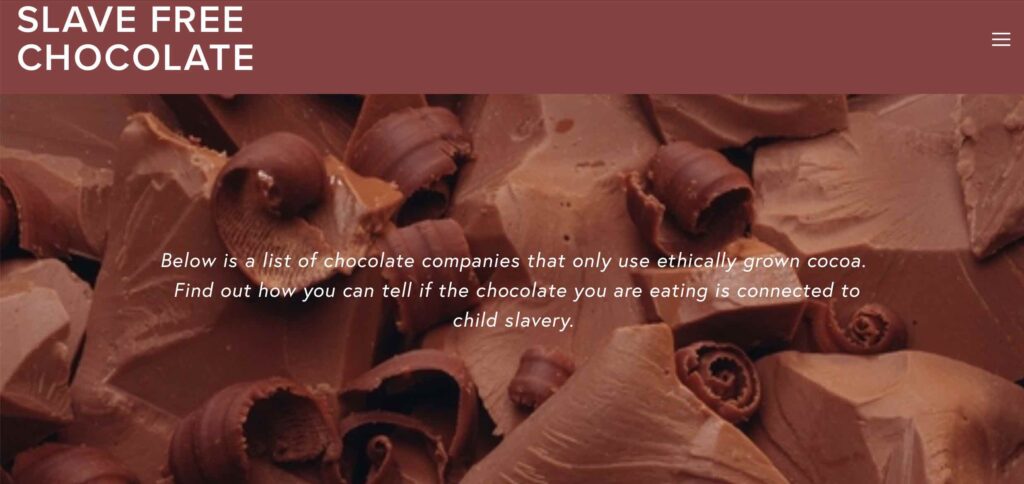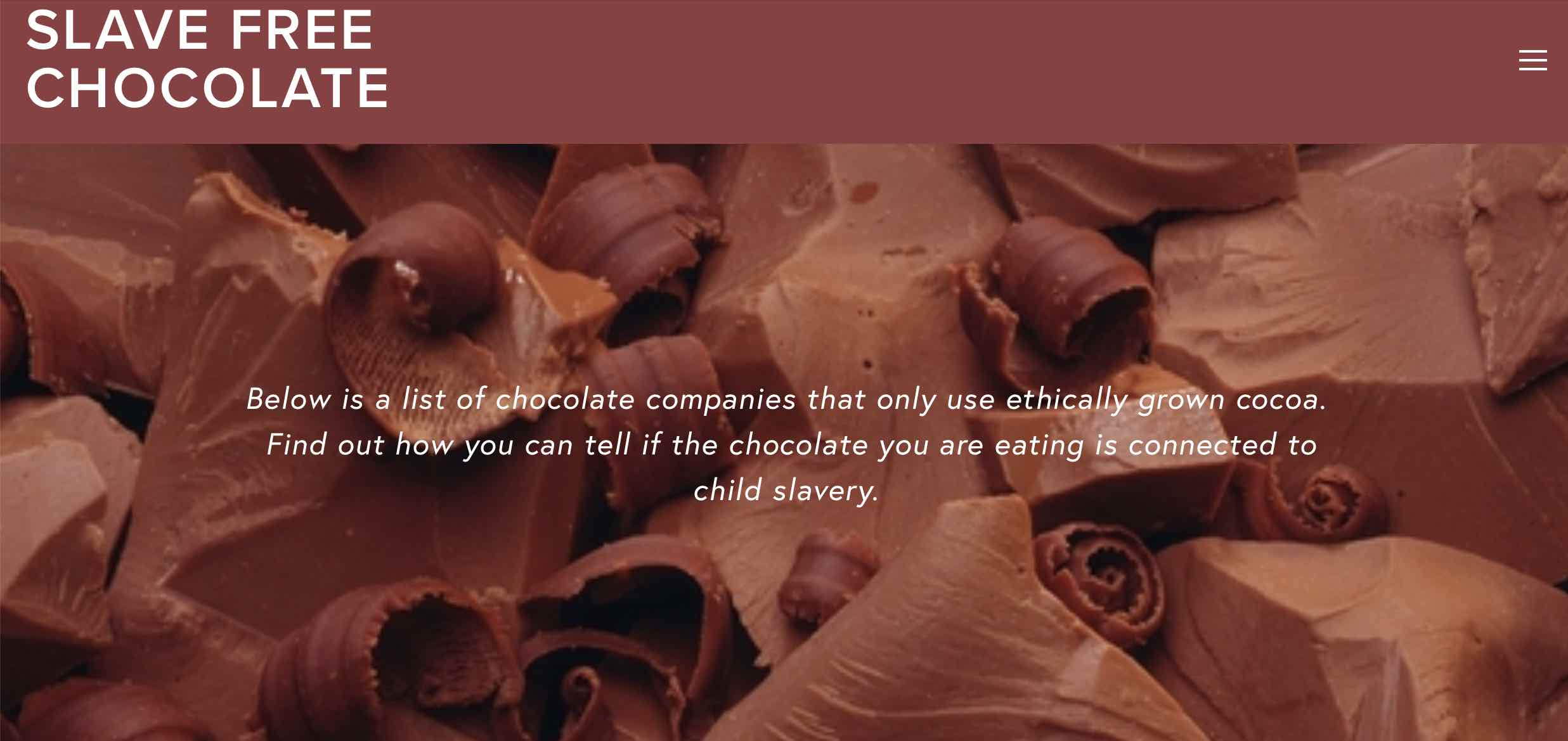In Chocolate Bar None, I explore why I buy and eat any chocolate that I enjoy, regardless of ethical or environmental considerations.
While I am confident in the research methods and findings that led to this decision, I also want to dialogue with others who approach chocolate differently.
It’s a pleasure to welcome Ayn Riggs, founder of Slave Free Chocolate, to learn about her chocolate principles and decision-making.
I wrote about Slave Free Chocolate in the introduction to Cocoa. Last year, Ayn got in touch to share her response to my analysis, particularly of the site’s messaging about West Africa.
Since Ayn opened the door to our dialogue, I have learned more about her work. I admire the strength of her convictions.
Ayn is unafraid to call out what she sees as failings of the chocolate industry, even directly to individuals she holds responsible. I have seen her do as much! It’s impressive and inspiring.
Below is a conversation with Ayn about what chocolate she buys, and why.
Who gets the chocolate green light from Ayn?
Tell me about your relationship with chocolate.
I do like chocolate, but I would not call myself a chocoholic or anything close to that. Since starting Slave Free Chocolate, the word “chocolate” has entered my orbit about 1000 times a day. Sometimes this leads me to crave chocolate, and sometimes just the opposite. As an artist by trade, I do enjoy visiting the websites of the companies I am vetting for The Ethical Suppliers List. Chocolate does lend itself to beautiful imagery and design, and for the passion chocolate makers and chocolatiers have for their work to shine through.
What chocolate(s) do you buy for yourself, or for others?
That is a good question. When I give speeches, I buy an assortment of ethically sourced chocolates for the audience, but that is really the only time I buy chocolate for others. There is so much good chocolate available it is hard to pick a brand. If I buy a bar for myself, it is often Divine’s Seriously Smooth Milk Chocolate. Divine sources cocoa from the Fairtrade-certified Kuapa Kokoo cooperative in Ghana, and I want to support West African cocoa as much as I possibly can.
What chocolate would you never buy?
Anything that is connected to Mars, Hershey’s, Nestlé, Cadbury, Mondelez, Barry Callebaut, Olam, or Cargill.

Why chocolate?
As an activist, I know you have taken up other causes. Why was chocolate especially compelling for you?
For many reasons. For starters, when I found out that illegal child labor and child slavery [were] rampant in the industry, I realized that I was complicit. Then I found out that only a handful of companies were behind this, and that those companies had promised to remedy all of this 5 years before I found out about it. [They hadn’t], and I was outraged.
When I started Slave Free Chocolate 5 years after the Harkin Engel Protocol was signed, all public concern that prompted the protocol had completely waned. There was no group I could donate to or help, so I stepped up as I should have.
There is currently a continual narrative about white privilege in the US. I see these big complicit chocolate companies as being the epitome, the King Kongs, of white privilege.
A $100 billion industry that blatantly shirks promises to farmers and children in their supply chain? Nope, I am not having any of that. I have no problem squaring off with them and holding them accountable to the promises they made, not only to the world but to these exploited children.
How to make Ayn’s approved list
You recently took Tony’s Chocolonely off your list of approved brands. You discussed this decision during the Ethical Egg Hunt in March, and others have written about it. I’d like to ask about your criteria for “approving” a brand. How do you decide whether a company merits inclusion on Slave Free Chocolate’s Ethical Companies list?
As an activist, my job is to educate and inspire people to help fight for a more just world. So we need “calls to action.” One way to do this is to buy ethically sourced chocolate. It is a way to voice your opinion with your dollar. Activism is why the list exists; we are not a marketing company. To get on the list, I ask a few questions, but mainly have these companies attest to the fact that nowhere in their business model do they buy slave tainted cocoa, or partner with a complicit company.
I gave Tony’s 15 years to prove that they were going to change the industry from within and, obviously, if you look at the data, that hasn’t happened. What I worry about — and am starting to see — is the solidification of a niche marketing sub-industry [appealing to] woke buyers.
Buying an ethical chocolate bar is how you can voice your opinion, and reward those companies doing the right thing, but it isn’t going to help any of these children. Tokenism in the industry is a very clever marketing idea, and it’s starting to work.
“Cadbury can’t be all bad, because they own Green and Black’s?” “Tony’s is changing the industry from the inside, right?” That is a seriously dangerous thing to rely on.
What about the cocoa farmers?
You and I have talked about the differences between what people outside West Africa might believe is true about cocoa farmers, and what farmers say. How do you work to bring farmers’ perspectives into your activism?
This is an interesting question. The truth is that, in the developing world, it is normal and many times necessary for children to help their parents on the family farm or in a small business, perhaps a small corner store. In the US, a summer working on your uncle’s apple farm in Wisconsin can be a very rewarding and healthy experience. [But] at some point, what may be necessary and not harmful can become harmful.
I use the ILO Convention 182 to show where the world draws a line in the sand. In the case of these 1.5 million children, we are talking about children who aren’t going to school at all, who are working with toxic pesticides, who have no access to medical care.
I am not blaming the farmers. I am blaming the companies that make up this $100 billion industry that do whatever they can to keep the price of the beans as low as they can. Paying rock bottom prices for the beans is why 1.5 million children are considered [to be working in] illegal child labor.
What do you hope readers take away from a visit to the Slave Free Chocolate site?
It really boils down to one message that nothing will change for the better unless the complicit big chocolate companies sit down together, and actually enact decisive, meaningful change. One can’t go alone, they all have to work together.
That is the only goal of Slave Free Chocolate. We are talking about a $100 billion industry that promised to do this, so I believe it can happen. When it does, it would be a win for humanity.

Ayn and I do take different approaches — activist in Ayn’s case, scholar in mine. But I believe we share a similar goal: to ensure that everyone working in cocoa is treated with fairness and dignity, with the full respect they deserve.
Thank you Ayn, for taking the time to share your perspective with me.




